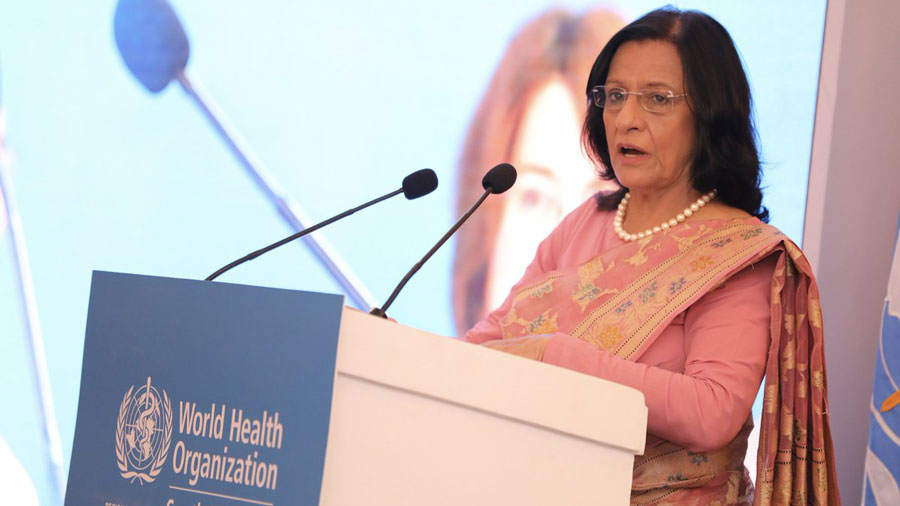The Omicron variant has now been identified in 89 countries and is spreading significantly faster than the Delta variant in places where community transmission is high, with a doubling time between 1.5 3 days, the WHO has said.
In its 'Enhancing Readiness for Omicron (B.1.1.529): Technical Brief and Priority Actions for Member States' report on Friday, the World Health Organisation said that given the current available data, it is likely that Omicron will outpace Delta where community transmission occurs.
"Omicron is spreading rapidly in countries with high levels of population immunity and it remains uncertain to what extent the observed rapid growth rate can be attributed to immune evasion, intrinsic increased transmissibility or a combination of both," it said.
"As of 16 December 2021, the Omicron variant has been identified in 89 countries across all six WHO regions. Current understanding of the Omicron variant will continue to evolve as more data becomes available," it said.
There is consistent evidence that Omicron has a substantial growth advantage over Delta. It is spreading significantly faster than the Delta variant in countries with documented community transmission, with a doubling time between 1.5 3 days, the global health body said.
The WHO designated Omicron, or B.1.1.529 variant, as a variant of concern (VOC) on November 26 after it was first detected in South Africa.
There is still limited data on the clinical severity of Omicron. More data are needed to understand the severity profile and how severity is impacted by vaccination and pre-existing immunity, the WHO said.
The overall threat posed by Omicron largely depends on how transmissible the variant is; how well vaccines and prior infection protect against infection, transmission, clinical disease and death; how virulent the variant is compared to other variants; and how populations understand these dynamics, perceive risk and follow control measures, including public health and social measures, it said.
There is still limited available data, and no peer-reviewed evidence, on vaccine efficacy or effectiveness to date for Omicron, the WHO added.

Regional Director of WHO’s South-East Asia Region Poonam Khetrapal Singh Twitter/ @WHOSEARO
With seven countries in the South-East Asia Region confirming cases of new COVID-19 variant Omicron, WHO stressed on urgent scale-up of public health and social measures to curtail its further spread.
Countries can and must prevent the spread of Omicron with proven health and social measures, Regional Director, WHO South-East Asia Region, Poonam Khetrapal Singh said.
"Our focus must continue to be to protect the least protected and those at high risk, she said in a statement."
The overall threat posed by Omicron largely depends on three key questions - its transmissibility; how well the vaccines and prior SARS-CoV-2 infection protect against it, and how virulent the variant is as compared to other variants.
"From what we know so far, Omicron appears to spread faster than the Delta variant which has been attributed to the surge in cases across the world in the last several months," Singh said.
Emerging data from South Africa suggests increased risk of re-infection with Omicron, she said, adding that there is still limited data on the clinical severity associated with Omicron.
Further information is needed to fully understand the clinical picture of those infected with Omicron, she said.
We expect more information in the coming weeks. Omicron should not be dismissed as mild, Singh said, adding that even if it does cause less severe disease, the sheer number of cases could once again overwhelm health systems.
Hence, health care capacity including ICU beds, oxygen availability, adequate health care staff and surge capacity need to be reviewed and strengthened at all levels, she stressed.
We must continue to do it all. Protect yourself and protect each other. Get vaccinated, wear a mask, keep a distance, open windows, clean your hands and cough and sneeze safely. Continue to take all precautions even after taking vaccine doses, Singh said.
On the impact of the new variant on vaccines, she said preliminary data suggests that vaccines may likely have reduced effectiveness against infections by the Omicron variant.
However, studies are underway to better understand the extent to which Omicron may evade vaccine and/or infection derived immunity and the extent to which current vaccines continue to protect against severe disease and death associated with Omicron, she said.
Globally, the pandemic is driven by the Delta variant, against which vaccines continue to provide a robust level of protection from severe disease, hospitalisation, and death. Hence, efforts to scale-up vaccination coverage must continue, the WHO official said.
Vaccines are an important tool in our fight against the pandemic, but, as we know, vaccines alone will not get any country out of this pandemic. We must scale up vaccination and at the same time implement public health and social measures, which have proven critical to limiting transmission of COVID-19 and reducing deaths, Singh said.











